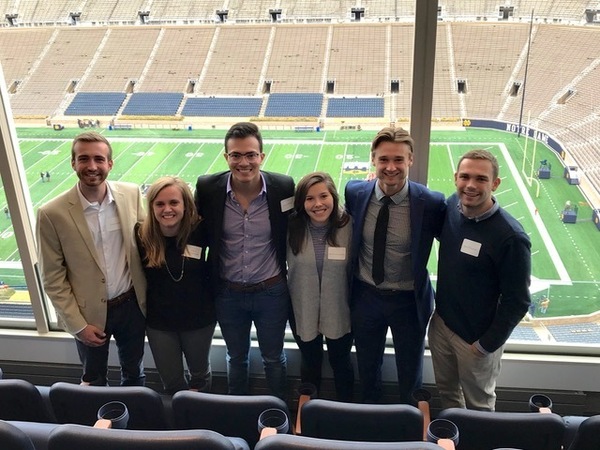
When Juan Cisneros (‘18) read the call to action to, “submit proposals for innovative projects looking into the causes, treatment, and prevention of cancer” from the Research Like a Champion (RLAC) program, he hypothesized unique ways to care for the human at the heart of cancer treatment. The RLAC grant is one of the most competitive research grants at the University of Notre Dame, which awards $12,500 to projects that have a novel pathway to create a tangible impact. Within days of learning about this opportunity, Juan recruited a team of his ESTEEM colleagues, Claire Kleinschmidt, Brady Riesgraf, Cian O’Donnell, Daniel Hogan, and Marissa Koscielski, to brainstorm the pains and hurdles individuals with cancer encounter on every front from diagnosis through hospice care, arriving ultimately on lung cancer in the Midwest. Initial research on the topic uncovered a staggering statistic: although a low-risk technology exists to screen for lung cancer, Indiana has an abnormally high incidence and mortality rate of this specific type of cancer. Their initial response: Why?
Diving into this topic, the RLAC team recruited undergraduate student Trever Carter, Pulmonologist Matthew Koscielski, and Information Systems Librarian Matthew Sisk to develop a comprehensive study to answer this question and ideate an innovative solution to improve lung cancer screening and improve survivorship. The research team decided to target rural communities throughout Indiana, which usually have minimal adequate healthcare options and have a higher percentage of smokers, based on literature review. Juan used an initial Geographic Information Systems (GIS) analysis to identify the most at risk communities for lung cancer within Indiana, based on US Census data. Next, the team conducted 250 interviews within these rural communities across 5 counties to gauge the communities’ overall awareness of this new scanning method, risk factors, access to care, and prior exposure to pulmonary disease detection. From the data collected in the interviews and a more thorough GIS analysis to model lung cancer risk, the RLAC team has delineated a three step solution that will increase lung cancer screening awareness, breakdown the barriers of accessibility by bringing the scan to the patient, and create fellowship between smokers, patients, and survivors. After a feasibility analysis and a pilot program, the team hopes their work will create a scalable, sustainable solution that can be used to improve lung cancer awareness and screening in communities across the country. With this, students hope to have a sustainable impact in how at risk individuals are informed of, and treated, with new technologies that may significantly improve their health.
The students are applying for two additional grants and will be presenting at Notre Dame’s Cancer Research Day as well as at the Lung Force Expo in Indianapolis this year. Besides this, a white paper is set to be published in May. Upon graduation, the team wishes to see this project continue among future ESTEEM students, and therefore an advisory board will be created with some of the current members along with a lung cancer expert. Juan will lead this advisory board and will be meeting with the next ESTEEM class to interview interested students.
Lung cancer screening is covered by Medicare and many private insurers. It is not invasive and the scan takes about 10 minutes.
Screening is key to early detection – when lung cancer is diagnosed at an early stage, it is more likely to be curable. If you, or anyone you know, is between 55 and 77 and has a history of smoking, please complete this quiz to see if you should get screened.
Originally published by at esteem.nd.edu on April 02, 2018.